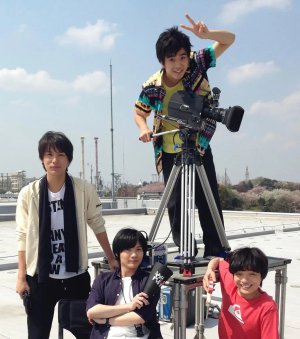The Best Dynamic
Yugami and Hanyu are as different as chalk and cheese, and their dynamic is what lends the show its depth and its buoyancy, keeping the proceedings equal parts emotional and equal parts comical without one overbearing the other. Hanyu is the rookie detective, the stickler for the rules, and the emotional one of the two, while Yugami on the other hand, is the senior detective but acts like a buffoon, much to Hanyu’s annoyance. He has his own method of investigation, which largely doesn’t line up with police protocol, but all his playfulness is just a facade that he uses to observe and make notes of, most of which escape the other officers' eyes. And though Hanyu may not like his methods, he respects Yugami.
Each episode concentrates on a completely new case, and instead of highlighting one social issue per episode, the writers and directors, present the victim, the suspects and the culprit as complex beings, and the issues they face, could be an amalgamation of many problems at hand, some created by their circumstances and some by the society. Like for example, there is the running joke in the show that Kanno Rika (a delightful Inamori Izumi) is 40 years old yet unmarried. But later in one of the cases, Kanno’s own classmate is murdered, who was also unmarried. And while the case was more about people creating false personas of themselves on social media, it also comments on how hard it was on the victim’s mental health to constantly battle her decision to remain single, and not raise a family. On the same spectrum, you also have a retired banker, also unmarried, who finds his post-retirement life absolutely boring, as all he has ever done his whole life was work. This episode with a focus on Japan’s ageing population also concentrates like the aforementioned case, the loneliness permeating through people’s lives.
Consciously or unconsciously, many of the cases revolve around women but thankfully aren’t depicted as rah-rah feminist stories. The cases depict them as complicated beings, capable of being victims as well as perpetrators. A girl molested on the train. A daughter orphaned. A wife raped. A single mother. What keeps the show and it’s proceedings grounded is that none of the cases involve some big mastermind criminal. They are all normal people who felt trapped or felt desperate to act out in this way. Hence, it explains the need to give a significant portion of the episode to the perpetrators to explain their side of the story.
Each episode concentrates on a completely new case, and instead of highlighting one social issue per episode, the writers and directors, present the victim, the suspects and the culprit as complex beings, and the issues they face, could be an amalgamation of many problems at hand, some created by their circumstances and some by the society. Like for example, there is the running joke in the show that Kanno Rika (a delightful Inamori Izumi) is 40 years old yet unmarried. But later in one of the cases, Kanno’s own classmate is murdered, who was also unmarried. And while the case was more about people creating false personas of themselves on social media, it also comments on how hard it was on the victim’s mental health to constantly battle her decision to remain single, and not raise a family. On the same spectrum, you also have a retired banker, also unmarried, who finds his post-retirement life absolutely boring, as all he has ever done his whole life was work. This episode with a focus on Japan’s ageing population also concentrates like the aforementioned case, the loneliness permeating through people’s lives.
Consciously or unconsciously, many of the cases revolve around women but thankfully aren’t depicted as rah-rah feminist stories. The cases depict them as complicated beings, capable of being victims as well as perpetrators. A girl molested on the train. A daughter orphaned. A wife raped. A single mother. What keeps the show and it’s proceedings grounded is that none of the cases involve some big mastermind criminal. They are all normal people who felt trapped or felt desperate to act out in this way. Hence, it explains the need to give a significant portion of the episode to the perpetrators to explain their side of the story.
Was this review helpful to you?





